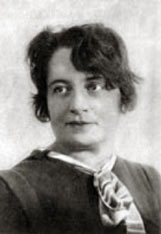Yelizaveta Tarakhovskaya
| Yelizaveta Yakovlevna Tarakhovskaya | |
|---|---|
 |
|
| Born |
July 26, 1891 Taganrog, Russian Empire |
| Died | November 11, 1968 (aged 77) Moscow, USSR |
| Occupation | Poet |
| Nationality | Russian |
| Period | 1925-1968 |
| Genre | children books |
| Notable works | play By the Pike's Wish |
Yelizaveta Yakovlevna Tarakhovskaya (Russian: Елизаве́та Я́ковлевна Тарахо́вская; 1891–1968) was a Russian poet, playwright, translator, and author of children's books.
Yelizaveta Tarakhovskaya (born Parnokh) was born in the city of Taganrog on July 26, 1891 in a pharmacist's family. She is sister to poet Sophia Parnok and twin sister to founder of Soviet Russian jazz Valentin Parnakh. She graduated from the Taganrog Girls Gymnasium, later studied in Bestuzhev courses in Saint Petersburg and started to write poems in her childhood.
In 1925, her first books were published: On How Chocolate Came to MosSelProm and Tit Will Fly. Since then, she wrote many children's books, including Metropolitan (1932), The Moon and the Lazy Fellow (1933), The Seagull (1965, dedicated to Valentina Tereshkova, Soviet Russian cosmonaut, the first woman to go into space). She is the author of poems for grown-ups: The Violin Clef (1958), The Bird (1965). The verses of Tarakhovskaya are lyrical, thoughtful, and almost always full of humor, with most of them being the poetry of ordinary and everyday things around.
Yelizaveta Tarakhovskaya translated into Russian many poems for children written by various Soviet and foreign authors: verses of Polish poet Julian Tuwim, Uzbek poet Kuddus Muhammadi (Muhammadiev), Azerbaijani poet Mirvari Dilbazi, Georgian poet Mariki Baratashvili(მარიკა ბარათაშვილი), Lithuanian poet Eduardas Mieželaitis, Bulgarian poet Assen Bossev and many more.
Today Tarakhovskaya is probably most known for her play By the Pike's Wish, which was staged by Sergey Obraztsov in the Moscow State Academic Puppet Show named after Serguei Obraztsov in November 1936 and has remained in the theater's repertoire ever since. The play By the Pike's Wish (Po shchuchuyemu veleniyu) is considered by theater experts as the greatest puppet show of the 20th century, making quintessence of Meyerhold's methods. It was also released as a motion picture in 1938 (directed by Aleksandr Rou).
...
Wikipedia
